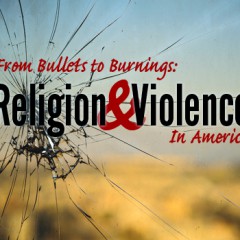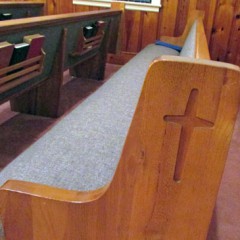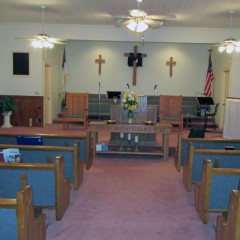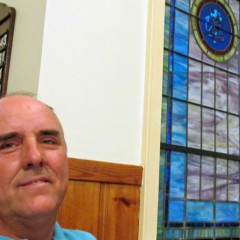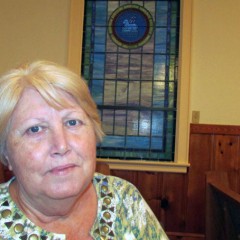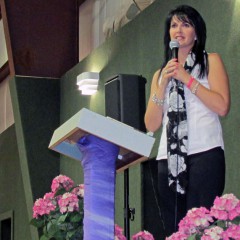This week, Faith & Values news explored what happens when violence crosses thresholds in churches, synagogues and mosques. Whether it’s gunshots, fires or fists, when violence touches a congregation it’s felt in ripples, often for years to come. In Whiteville, N.C., one church community’s memories of bombings and murders that happened decades ago still seem raw. Despite the residual shockwaves, the community and those at the center of the horror show steadfast resolve at moving forward, slowly but surely.
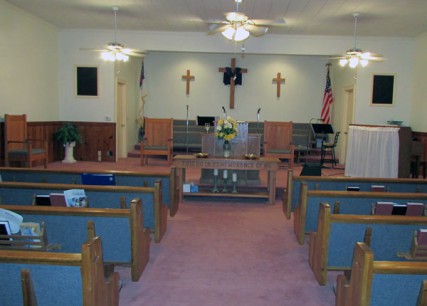
Since the bombings that rocked the Free Welcome Holiness Church’s parsonage and sanctuary on Sellerstown Road near Whiteville 35 years ago, pastors hired there often hear something like this: “You mean you’re going to preach at that church that used to get blown up all the time? You’re gonna get shot.”
That’s how the Rev. Roger Coffey, the church’s current pastor, remembers the dire warnings he heard in 2001. (The church’s name changed shortly after the bombings to Free Welcome Christian Church.)
But for those on Sellerstown Road who experienced the 10 bombings from 1972 to 1978, plus the shootings of a pastor and his wife there, the memories are still close.
The man in pew number seven
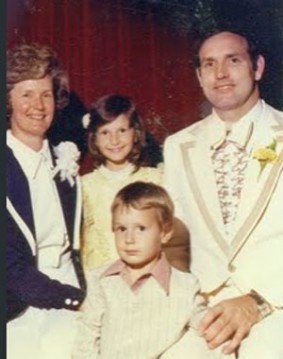
Horry James Watts, a former Columbus County Commissioner, was not a member of Free Welcome but attended regularly, yet he controlled much of the church’s business. That was until the Rev. Robert Nichols, his wife, Ramona and their children Rebecca and Danny came to the church in 1969.
Once Nichols decided only church members should vote on church business, Watts began intimidating the Nichols family. The incidents escalated from menacing phone calls to the parsonage 30-60 times a day and sending threatening letters, to a series of dynamite bombings around the parsonage and church that shattered the calm in the community. (One of these bombings was close enough to the parsonage to explode the windows in both children’s rooms, sending glass shards into baby Danny’s crib.) One threatening letter the Nichols received promised they would leave Sellerstown: “walking, crawling, dead or alive.”
Sellerstown is a dewdrop on the map squashed between great green tobacco and cornfields. When the bombings happened, about 50 people lived in the community.
One man said that a bomb blast at the parsonage made the peas jump in his stove’s pot, though his house was miles away.
“It wasn’t nothing for us to be singing in the choir on Sunday and for them to ride by and shoot the lights out,” said Carolyn Sellers, a longtime church member, after a recent Wednesday night prayer service.
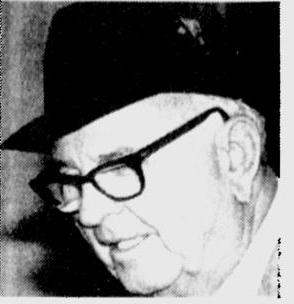
Watts lived right across the street from the parsonage. Yet police, FBI and ATF agents could not gather enough physical evidence or witness testimony to trace the calls or the bombings to him for five years.
At the height of the bombings, the grand dragon of the Columbus County Ku Klux Klan sent his assistant to the Nichols’ door, offering to “take out” the man responsible for the bombings.
Nichols politely refused. He wanted to practice what he preached — to love his enemies.
Through it all the faith community grew and grew, and the Nichols became confidants in the community.
By then, it was too late. On Holy Thursday 1978, drunk and angry, a local man named Harris Williams walked into the Nichols’ home with three guns and 61 bullets in his pocket. William’s wife had fled his drinking, taking their baby to shelter with the Nichols family.
Williams pulled out his gun in a jealous rage and shot Ramona and the pastor in front of their children — 7-year-old Rebecca and 3-year-old Danny.
Williams then took his wife and baby hostage in a back bedroom of the parsonage, eventually surrendering to police.
Rev. Nichols survived the incident, but his wife Ramona did not.
Investigators later discovered that Watts had told Williams a lie — that Rev. Nichols was seducing Williams’ wife — driving Williams to a jealous rage. Williams served 21 years in prison for the shootings. Though Watts was sentenced in a separate case to 15 years for two counts of bombings and two counts of threatening an area resident, he served only one year in prison.
The Sellerstown bombings are symbolic of incidents with domestic dispute roots that boil over into worship places. About 16 percent of deadly force incidents at faith-based locations in the U.S. stem from domestic violence, according to Carl Chinn and statistics he keeps for his business, Church Security Concepts.
Church Executive magazine characterized the Sellerstown bombings as “avenger violence.”
In a 2010 column about the incidents, John Nicoletti and Sara Garrido wrote: “One lesson that is critically important for church communities to understand is that an Avenger will always make clear ahead of time that they are a threat. The key to averting a tragedy lies in church communities taking an Avenger’s ‘broadcasting’ seriously. Broadcasting can occur in a number of different ways, including verbal and written threats, videos, Web pages (Facebook, MySpace, YouTube, etc.), and practice sessions and boundary probing.”
In February 2013, a man fatally shot his ex-wife as she played the church organ during services at her Pittsburgh church. Between Easter and the end of June this year, two sons – one in Ohio and another in Utah – walked into two churches in separate incidents and shot their fathers in the head.
And the church communities that witnessed these incidents have many years of healing ahead.
‘The Devil in Pew Number Seven’
For a while – after the trials – the memory of what happened in Sellerstown was buried. It was a shallow grave, but buried nonetheless.
Then in 2010, came the book, “The Devil in Pew Number Seven.” It was Rebecca Nichols Alonzo’s memoir about those frightening years in her home and her family’s struggle in the aftermath of the violence. With the book came all the old memories of powerful bombings that resonated up to three miles away. Now, Alonzo is finalizing a movie deal about the experience.
Today, decades after the tragedy, a handful of people in slow-moving cars each week cruise by the church, taking photos. Some stop and ask neighbors to unlock the church so they can see the seventh pew where Watts often sat.
SEE FREE WELCOME CHRISTIAN CHURCH TODAY AS THE COMMUNITY CONTINUES TO HEAL (VIDEO)
Left with the memories and forgiveness
The memories of the bombings and shootings are fresh, even now, for Pat Sellers. She was one of Ramona’s closest friends. ‘Aunt Pat,’ as Alonzo calls her, was to whom the little girl ran after her parents were shot. Sellers was the one who dialed 911.
Pat still speaks about the bombings at church gatherings, like one on May 31 at United Vision Pentecostal Church in Shallotte. There she introduced Rebecca, who spoke about forgiveness in the wake of the violence done to her family.
“I loved her parents. I miss them, I do. To this day, I do. And we as a church family loved them, dearly,” she said. “And when someone came to take them away from us, we suffered dearly. The things her dad taught us when he was there are instilled in our spirit. He always preached love and forgiveness and kindness.”
Moving past the events of that time has proven a hard goal for the church family. The numbers in the church have never rebounded.
At the time of the bombings, church attendance grew from 12 to more than 100, some congregants driving 45 minutes to hear Nichols preach. Today, about 40 attend Sunday services. The highest recent attendance listed on a wall placard inside the church was 81.
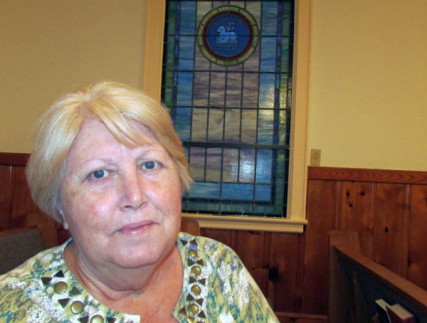
“For a while, the majority of people stayed. We talked amongst ourselves, and we’d say we can’t let them down. If we don’t keep it going, we’ll let them down,” said Carolyn Sellers, Pat’s sister-in-law. “It was very hard, I mean, there, Ramona was gone. But Brother Nichols, he taught us that no matter the circumstance you have to keep going.”
On a recent Wednesday night prayer service, a group of about 10 parishioners sat quietly listening to Coffey’s passionate storytelling about the need for Christians to carry the gospel. It was an informal service, and afterward the attendees greeted newcomers with hugs first and then handshakes.
“After [‘The Devil in Pew Number Seven’] came out, some people in town were angry. They didn’t think she should have written it,” Coffey added.
Many felt dredging up the old memories of trauma and guilt associated with the bombings wouldn’t help the community move on, that it would even re-victimize the church, Carolyn said.
Rebecca’s book may have brought those memories back to this tiny community, but some felt it allowed the church families who were left behind to tell their stories of resilience and forgiveness.
“There were kids I knew who were afraid to go to the bathroom in their homes at night because of the bombings,” Rebecca remembers. “This was wreaking terror on a whole community off and on for five years.”
‘Forgiveness is the language of heaven’
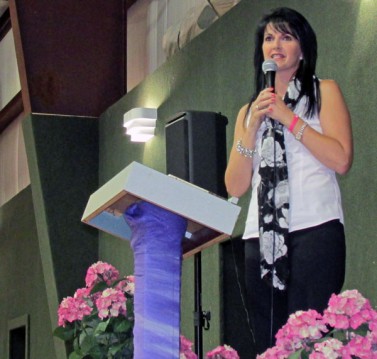
As for Rebecca Nichols Alonzo, carrying on the message of forgiveness her father and mother preached in their ministry has become her life’s work. She titles some of her talks: “Forgiveness is the language of heaven.”
“When I would say ‘I’m scared’ or ‘what if we die?,’ my mom would say, ‘Then we go to heaven,’ so she was trying to tell me to trust God even in the worst situations,” Rebecca said. “She saw it as a win-win situation. If we stay, then we get to continue telling people about Jesus.”
After losing her mother, and then, seven years later, losing her father to a blood clot, Rebecca spent a few of her teen years angry with God.
“The anger and bitterness were eating away inside of me like a cancer. I realized I needed God more than I needed to be mad at him (Watts),” she said. “That’s when all that peace came flooding into my life.”
Watts called her from prison to ask for forgiveness for tormenting and bombing the family. The teen Rebecca told him she was way ahead of him.
She and her brother met their mother’s killer years later on an episode of Dr. Phil after Williams was released from prison. They forgave him, too.
But Rebecca still has nightmares; she has trouble trusting. If she’s walking past a door in her house that’s not locked, she said she often finds herself wondering why it’s not locked. She believes the trauma of living through all the dynamite blasts outside her bedroom window resulted in post-traumatic stress disorder.
“Recently, when the Boston bombings happened, I had to ask my husband to turn the TV off,” she said. “I couldn’t watch it anymore because it reminded me too much of my childhood.”
Those experiences have made her a different parent, a more protective one. When her husband and children travel from their Tennessee home with her to speaking engagements, she dismisses them to another room while she retells the story of how their grandmother died.
“I want the best for my kids, to grow up in faith but not fear, but I want them to be wise. I do struggle with that,” Rebecca added.
As for Sellerstown, “I know it affected that community and left a big hole in their hearts. They have got on with their lives, but there is a stamp on that community forever being associated with the Sellerstown bombings.”
Amanda Greene is the editor of Wilmington Faith & Values.
Thanks for reading “From Bullets to Burnings: Religion & Violence in America.” To read Parts 1–4 of the series, use the links below.




